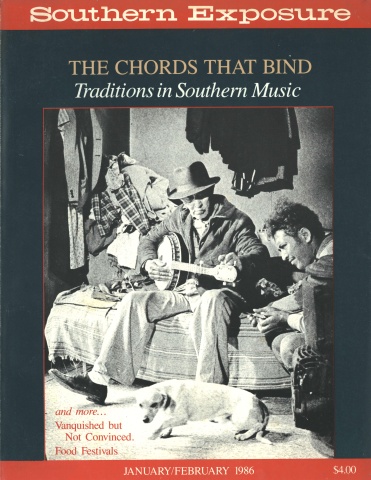1868: The Cry for Freedom from Southwest Georgia

This article originally appeared in Southern Exposure Vol. 14 No. 1, "The Chords That Bind." Find more from that issue here.
By December 1868 the excitement and joy which southwest Georgia blacks had experienced three and a half years earlier had long since vanished. Fully aware that Congress had no plans to continue the Freedmen's Bureau after December, planters and overseers ignored bureau agents' orders with impunity. In September the Georgia legislature expelled the nearly 30 blacks who had been elected the previous spring. That same month local whites shot at and dispersed a crowd of blacks who had gathered for a Republican political rally in the southwest Georgia town of Camilla. Nine died and nearly 40 were wounded.
In November 1868 blacks' political rights were sabotaged at the polls. In Dougherty County about 600 whites and 3,000 blacks voted. Nearly all of the blacks were Republicans, yet the Democrats "won" by 200 votes. Shortly after the elections, the Civil and Political Rights Association, a black political group, met in Albany, Georgia and decided to write Congress "setting forth their grievances, and asking protection." In the following conclusion, we hear the urgent and moving plea of American citizens who wanted simply to exercise their constitutional rights.
— Lee W. Formwalt
We are no revolutionists, but when we say that the present State government of Georgia does not answer the purpose for which it was established, protection and justice to all, we but speak a notorious truth.
We have confidence in the officials of the State government, but these officials have too little power and too great opposition to protect us in the enjoyment of our rights, and to this end the present military is of but little or no assistance to them; for be it known that while General Meade admits the civil authorities of Mitchell County were the authors of the outrage of Camilla, and while he must needs know that the civil authorities of other counties would, "under the guise of enforcing the law and suppressing disorder," act precisely as the civil officials of Mitchell county acted; yet in detaching his troops into these counties, he says, "I was particularly careful to require all intervention of the troops to be subordinate to, and in aid of, and in co-operation with the civil authorities." Under similar instructions at the election last April in Camilla the troops stood motionless, though seeing colored men shot at and run from town. . . .
Under these circumstances we are necessitated to look to your august bodies for protection. We do this the more readily because we believe it to be within the scope of your duty. Certainly, the first section of the 13th amendment to the Constitution of the United States needs to be enforced by "appropriate legislation." Webster defines slavery [as] "the state of entire subjection to another." If this is not now the condition of colored people in some parts of this district, such was never their condition. They are nominally "freed people," but now, as when they were "slaves," they receive nothing for their labor.
Of course, the foregoing is not meant to apply to all the white people indiscriminately; there are many honorable exceptions; but, upon the whole, "there is not enough of these men to stay the lawlessness of the others." Still we seek not their injury; we seek only our own protection. If this can be afforded us in southwest Georgia, then we are content to remain here and contribute our labor to the development of this country. But judging from the past and the present, protection cannot be afforded to us here; and with feelings similar to those of the Indian as he turns westward from the bones and hunting-grounds of his fathers, we ask to be removed to some other land.
We earnestly implore your honorable bodies to set apart some of the unoccupied public land in the west for the use of such of us as choose to remove thereto. . . . There were no colored persons of this district ever received the benefits of this section of the "bureau" bill, nor of the homestead acts of 1862 and 1866, because they had not the means of transportation to the lands embraced in these acts. But now some few of us have enough money to take us there, and a revival of the homestead or similar laws will induce us to go. But we greatly prefer public transportation, since those of us who suffer the most here are not able to pay their way. . . .
While our people will ever uphold and patriotically support the great government of the United States, while her great doctrines of freedom and equal rights have indelibly impressed us with feelings of love and devotion, we ask of her protection in those inherent rights to which she has declared us entitled.
This article is based on the Memorial of the colored men of the Second congressional district of Georgia, setting forth their grievances, and asking protection," December 4,1868, and on research supported by the National Endowment for the Humanities. Lee W. Formwalt is editor of the Journal of Southwest Georgia History at Albany State College in Albany Georgia.
Tags
Lee W. Formwalt
Lee W. Formwalt is editor of the Journal of Southwest Georgia History at Albany State College in Albany Georgia. (1986)